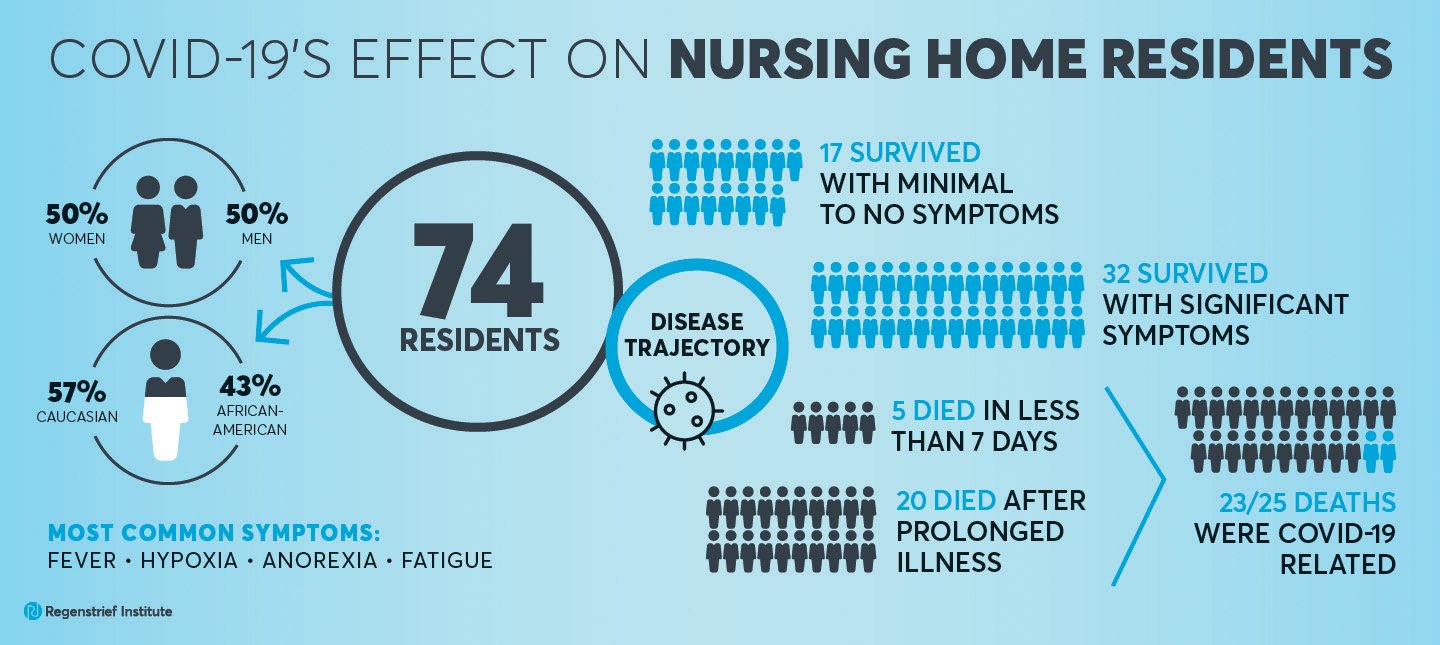Nursing homes throughout the United States have been devastated by the COVID-19 pandemic with many perceptions and misperceptions but little documentation about what has happened on a day-by-day basis to residents in these facilities. A study from Regenstrief Institute and Indiana University School of Medicine research scientists is one of the first to describe and identify patterns in the course of COVID-19 in the typically frail individuals who reside in nursing homes.
Much has been written about number of deaths, vaccine uptake and other topics related to the impact of COVID on nursing homes, yet prior to the Regenstrief-IU School of Medicine study, there has been little known about how the disease has clinically affected individuals residing in nursing homes. A full understanding of the disease burden and trajectories of COVID-19 in nursing home residents – those who died and those who survived COVID – will aid medical and public health professionals immediately, will help them prepare for outbreaks of variants and may inform efforts to confront outbreaks of other diseases.
“When the COVID outbreak occurred, we [physicians who care for nursing home residents] didn’t know, because we weren’t armed with knowledge or clinical experience, what to expect – who would do well and who wouldn’t,” said Regenstrief Institute Research Scientist Kathleen Unroe, M.D., senior author of the study. “This is a population that by their very need to reside in a nursing home, has complex medical conditions and is at high risk. And it’s a different population than younger adults. For example, some older adults may not experience fever in response to infection; persons with dementia may be unable to report symptoms.”
The researchers studied the electronic medical records (EMRs) of 74 nursing home residents infected with COVID of whom half were women, 57 percent were Caucasian and 43 percent were African American. One third (25) died; with 23 of the deaths considered related to COVID-19 infection. Hypertension was the most common comorbidity (81 percent) followed by dementia (51 percent), diabetes (50 percent) and non-dementia mental illness (43 percent). The most common symptoms were fever, hypoxia (low oxygen level in the blood), anorexia, and fatigue/malaise. None reported headaches. The duration of symptoms was extended, with an average of more than three weeks.
The 74 nursing home residents with COVID-19 infection appeared to fall into four disease trajectory categories:
- minimal to no symptoms (17)
- residents who survived but experienced significant symptoms (32),
- residents who died after a rapidly progressive course (less than seven days) (5)
- residents who died after a prolonged course with significant symptom burden (20)
“For many of nursing home residents who survive COVID-19, the duration of symptoms is long and arduous; most will survive the disease but may not get back to baseline,” said Dr. Unroe. “The effect of COVID on nursing home residents goes beyond the mortality numbers we saw.“
In addition to Dr. Unroe, authors of “COVID-19 Disease Trajectories Among Nursing Home Residents,” published online ahead of print in the Journal of the American Geriatrics Society, are corresponding author Regenstrief Institute Research Scientist and IU School of Medicine faculty member Jennifer Carnahan, M.D. and IU School of Medicine student Lauren Albert. Additional co-authors are Kristi M Lieb M.D.; Kamal Wagle M.D., MPH; Ellen Kaehr M.D., all of IU School of Medicine and Richard L. Roudebush VA Medical Center.
The study was funded by the National Institutes of Health’s National Institute on Aging (K23AG062797) and Centers for Medicare and Medicaid Services (Grant 1E1CMS331488).
About Regenstrief Institute
Founded in 1969 in Indianapolis, the Regenstrief Institute is a local, national and global leader dedicated to a world where better information empowers people to end disease and realize true health. A key research partner to Indiana University, Regenstrief and its research scientists are responsible for a growing number of major healthcare innovations and studies. Examples range from the development of global health information technology standards that enable the use and interoperability of electronic health records to improving patient-physician communications, to creating models of care that inform practice and improve the lives of patients around the globe.
Sam Regenstrief, a nationally successful entrepreneur from Connersville, Indiana, founded the institute with the goal of making healthcare more efficient and accessible for everyone. His vision continues to guide the institute’s research mission.
About IU School of Medicine
IU School of Medicine is the largest medical school in the U.S. and is annually ranked among the top medical schools in the nation by U.S. News & World Report. The school offers high-quality medical education, access to leading medical research and rich campus life in nine Indiana cities, including rural and urban.
Kathleen Unroe, M.D., MHA, M.S.
In addition to being a research scientist at Regenstrief Institute, Kathleen Unroe, M.D., MHA, is an associate professor at Indiana University School of Medicine and a practicing geriatrician.
Jennifer Carnahan, M.D., MPH, M.A.
In addition to her role as a research scientist at Regenstrief, Jennifer Carnahan, M.D., MPH, M.A., is an assistant professor of medicine at Indiana University School of Medicine.









